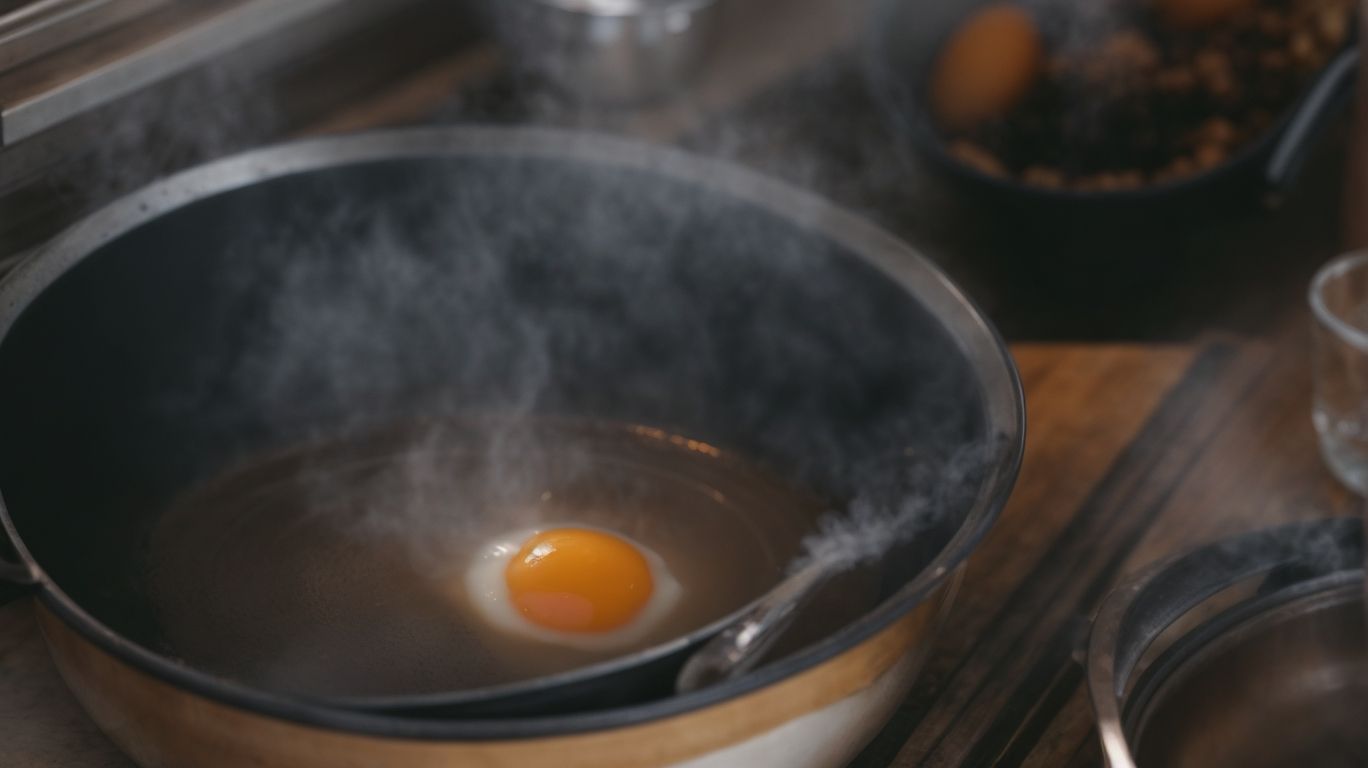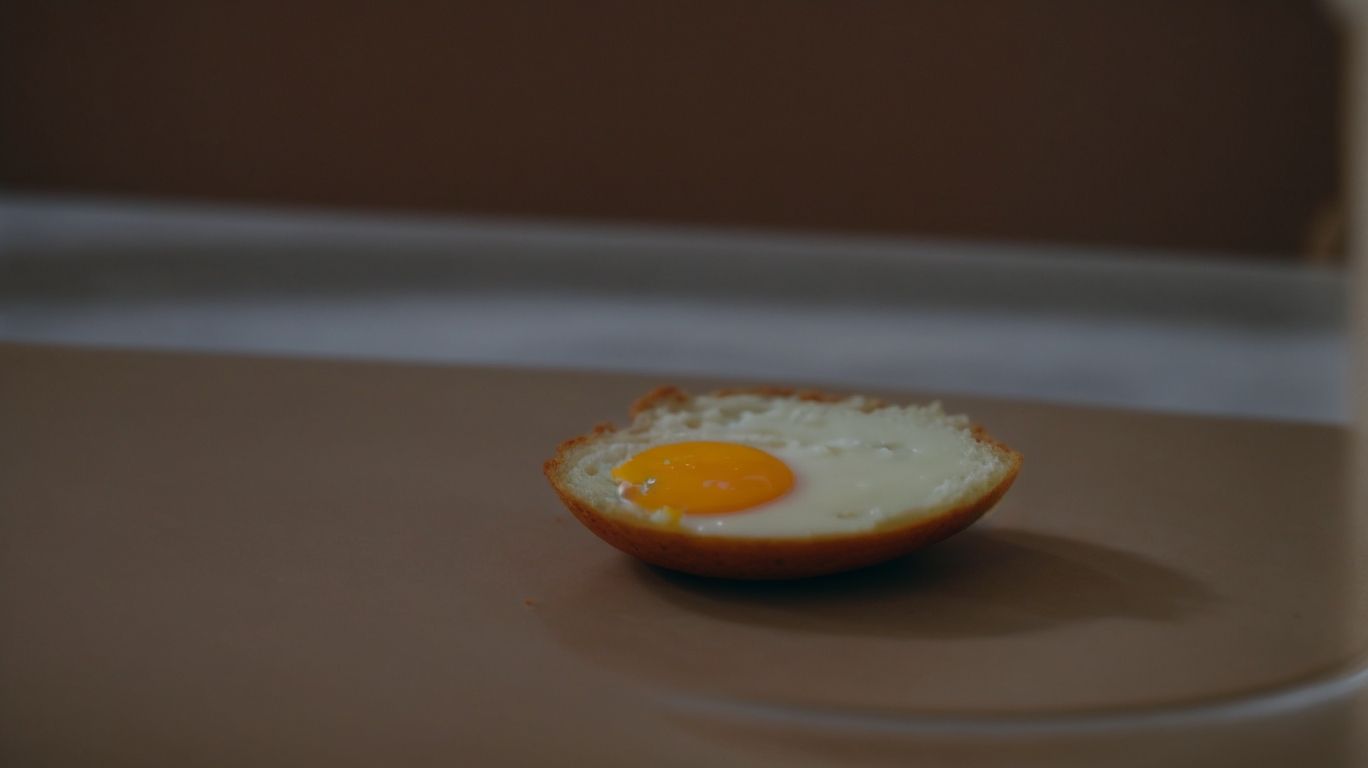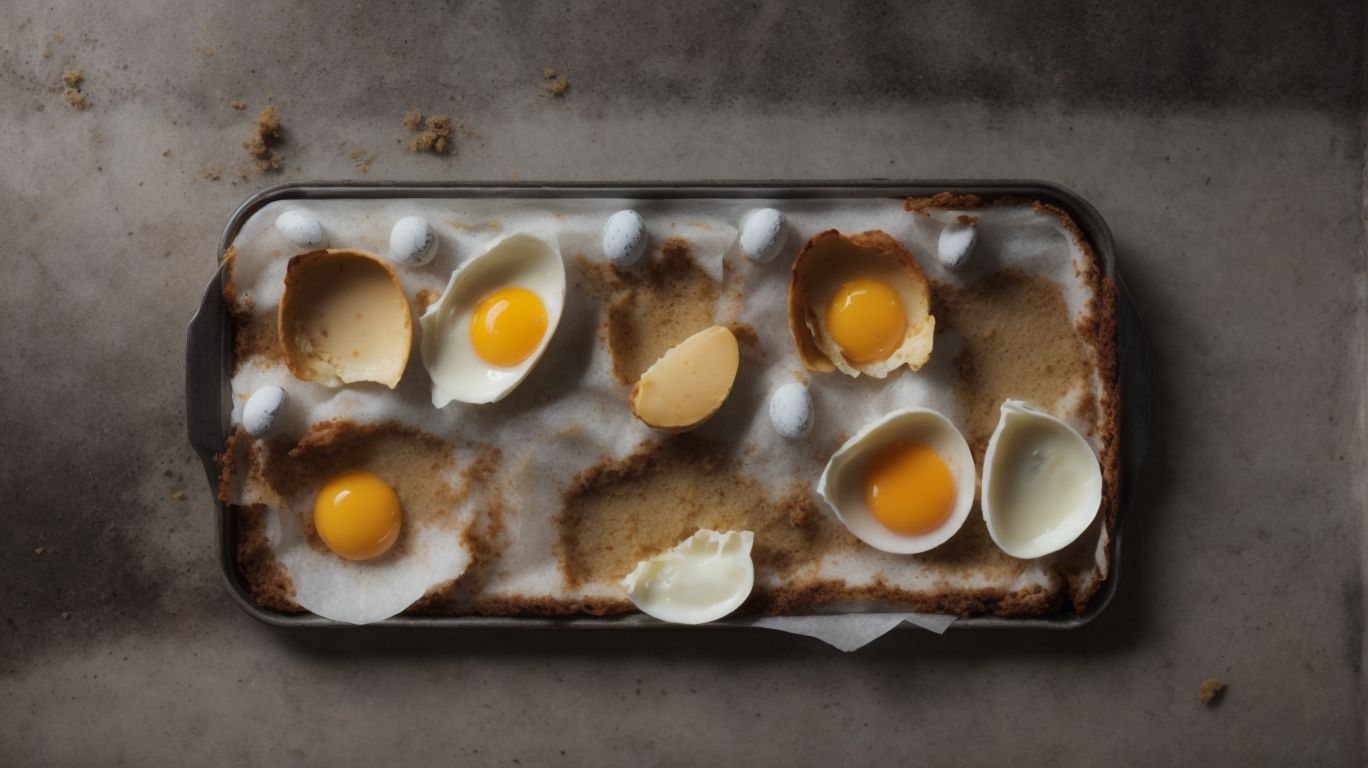How to Bake Eggs Without Sticking?
Are you tired of your eggs sticking to the pan every time you cook them?
We will explore the different ways to cook eggs and why they tend to stick to the pan. From using a non-stick pan to preheating the pan properly, we will discuss all the tips and tricks to prevent your eggs from sticking.
Discover some creative ways to bake eggs without them sticking, so you can enjoy a delicious meal without the hassle of cleanup. Stay tuned to learn more!
Key Takeaways:
What are the Different Ways to Cook Eggs?
Cooking eggs offers a plethora of delicious possibilities, from scrambled to sunny-side up, each method providing a unique flavor and texture experience.
Scrambled eggs are a popular choice for a quick and easy breakfast, requiring eggs, a whisk, and a skillet. By beating the eggs and then cooking them over medium heat, you can achieve a creamy and fluffy texture.
On the other hand, a sunny-side-up egg entails cracking an egg into a hot pan with a bit of oil or butter, allowing the yolk to remain runny while the white sets.
For a more adventurous option, you could try poaching an egg in simmering water for a perfectly gooey center.
Why Do Eggs Stick to the Pan?

Credits: Poormet.Com – Bruce Taylor
Eggs sticking to the pan can be attributed to factors like improper heat, using the wrong cooking method, or insufficient lubrication of the cooking surface.
What Causes Eggs to Stick to the Pan?
The adhesion of eggs to the pan can be triggered by factors such as residual moisture, high heat levels, or the chemical composition of the cooking surface.
Regarding residual moisture, excess water in the eggs can cause them to stick to the pan, forming a steam barrier that hinders their release. High heat levels can lead to rapid protein coagulation, creating a strong bond between the eggs and the pan surface.
The chemical composition of the cooking surface plays a critical role. Non-stick pans with a damaged coating or uneven surface may increase the likelihood of eggs sticking, whereas properly seasoned cast iron or stainless steel pans can promote better egg release.
How to Prevent Eggs from Sticking to the Pan?
Preventing eggs from sticking to the pan involves employing techniques such as proper lubrication, suitable cookware selection, and precise heat control.
Use a Non-Stick Pan
Utilizing a non-stick pan can significantly reduce the likelihood of eggs sticking during the cooking process, promoting a hassle-free culinary experience.
One key benefit of using a non-stick pan for cooking eggs is the ease of flipping them without worrying about them breaking or sticking to the surface. This type of pan ensures that your eggs slide out effortlessly, resulting in perfectly cooked dishes every time. Cleaning up after cooking is a breeze with a non-stick pan, as food residue is less likely to cling to the surface, making it simpler to wipe down. The use of a non-stick pan enhances the quality of your eggs by allowing them to cook evenly and without the need for excessive oil or butter.
Use Enough Fat or Oil
Ensuring adequate fat or oil in the pan creates a lubricated surface that helps prevent eggs from sticking, resulting in a perfectly cooked dish.
When you cook eggs, the fat or oil acts as a barrier between the eggs and the pan, ensuring that they slide off easily without leaving a mess behind. This lubricating effect not only prevents sticking but also enhances the flavor and texture of the eggs, promoting a delightful culinary experience. Fat or oil also plays a vital role in distributing heat evenly, contributing to the overall cooking process and helping achieve that desired consistency.
Preheat the Pan
Preheating the pan to the right temperature is crucial to create a non-stick surface for cooking eggs, ensuring even heat distribution and optimal results.
When the pan is heated properly before adding the eggs, it forms a thin film of oil or butter which acts as a barrier between the eggs and the pan surface, preventing the eggs from sticking. This initial step allows the eggs to cook more evenly and efficiently, resulting in a perfect texture and taste.
Without preheating, the eggs may stick to the pan, leading to a messy clean-up and a less visually appealing final dish. By heating the pan beforehand, you set the stage for a hassle-free cooking experience and delicious eggs every time.
Use the Right Heat
Employing the correct heat level when cooking eggs ensures that they cook thoroughly without sticking to the pan or becoming overcooked, preserving their flavor and texture.
Controlling the heat is crucial because eggs are delicate and can easily become rubbery or runny if not cooked at the right temperature. When the heat is too high, eggs can quickly turn tough and lose their tenderness, while low heat results in uneven cooking and often leads to the eggs sticking to the pan.
Adjusting the heat allows you to achieve the desired consistency, whether it’s soft and creamy scrambled eggs or perfectly set fried eggs with a runny yolk. Proper heat management also prevents the development of a grayish-green ring around the yolk, known as ‘sulfur ring,’ which occurs when eggs are overcooked.
Use a Spatula or Wooden Spoon
Utilizing a spatula or wooden spoon to gently flip and maneuver the eggs in the pan helps prevent sticking and ensures even cooking for a delightful dish.
When cooking eggs, the right utensil can make all the difference. A spatula or wooden spoon allows you to delicately flip the eggs, ensuring that they cook evenly without breaking apart. These tools are excellent for gently stirring the eggs as they cook, distributing heat evenly and creating a creamy texture.
By using a spatula or wooden spoon, you can also achieve the perfect flip, giving your eggs that coveted golden-brown color without any mess. These utensils are particularly adept at reaching all corners of the pan, ensuring that your eggs are cooked to perfection every time.
Use a Parchment Paper or Foil
Lining the pan with parchment paper or foil before cooking eggs can create a barrier that minimizes direct contact between the eggs and the surface, reducing the risk of sticking.
Using parchment paper or foil offers the added benefit of easy cleanup, as these materials can be simply disposed of after use, eliminating the need for extensive cleaning. The non-stick properties of parchment paper further aid in preserving the shape and integrity of delicate egg dishes, ensuring a visually appealing presentation with minimal effort. Parchment paper can help regulate the temperature during baking, resulting in more evenly cooked eggs and reducing the chances of overcooking or undercooking. This versatile kitchen tool also promotes healthier cooking by minimizing the need for excessive oil or butter, making it an ideal choice for those seeking a lighter culinary experience.
Use a Cooking Spray
Applying a cooking spray to the pan before cooking eggs provides a non-stick surface, facilitating easy flipping and preventing residue buildup for a seamless cooking experience.
One of the key benefits of using a cooking spray is its ability to lubricate the pan evenly, ensuring that the eggs do not stick to the surface during the cooking process. This lubrication not only promotes effortless flipping of the eggs but also makes cleaning up afterward a breeze.
The cooking spray acts as a barrier between the eggs and the hot surface of the pan, preventing any potential burnt residue from forming. This not only helps in maintaining the quality of the pan but also contributes to a healthier cooking experience by avoiding the consumption of burnt bits.
Add Salt or Flour to the Pan
Sprinkling salt or flour in the pan before cooking eggs can create a protective barrier that reduces the chances of sticking and enhances the flavor profile of the dish.
When you sprinkle salt in the pan, it not only helps to prevent the eggs from sticking to the surface but also adds a subtle seasoning that amplifies the taste. The salt interacts with the egg proteins, altering their structure and making them less likely to adhere to the pan.
On the other hand, using flour can provide a similar non-stick effect. The flour absorbs excess moisture from the eggs, creating a drier surface that promotes better browning and texture development.
How to Bake Eggs Without Sticking?

Credits: Poormet.Com – Keith Mitchell
Baking eggs without sticking involves using appropriate baking vessels like ramekin dishes, muffin tins, cast iron skillets, or baking dishes to ensure a smooth and delicious baking experience.
Baked Eggs in a Ramekin Dish
Preparing baked eggs in a ramekin dish offers a charming presentation and hassle-free baking experience, ensuring the eggs cook evenly without sticking to the dish.
This cooking method allows you to customize each serving easily by adding various ingredients such as diced vegetables, herbs, cheese, or meats before baking, resulting in a flavorful dish that can cater to different taste preferences. To achieve the perfect texture, it’s important to control the baking time carefully, ensuring that the egg whites are set while the yolk remains slightly runny. Pairing baked eggs with crusty bread or a side salad can create a well-balanced and satisfying meal suitable for breakfast, brunch, or even a light dinner.
Baked Eggs in a Muffin Tin
Utilizing a muffin tin for baked eggs offers a convenient individual serving option and ensures the eggs cook uniformly without sticking, making it a delightful breakfast choice.
When preparing this dish, it is important to grease each cup of the muffin tin lightly to prevent the eggs from adhering to the surface. The advantage of using a muffin tin is that it allows for perfect portion control; you can easily customize the ingredients in each cup to cater to different tastes. Plus, baking eggs in a muffin tin is a time-efficient method, especially when cooking for a group, as you can prepare multiple servings simultaneously in the oven.
Baked Eggs in a Cast Iron Skillet
Baking eggs in a well-seasoned cast iron skillet imparts a rich flavor and ensures effortless release, making it a popular choice for creating savory baked egg dishes.
One of the key advantages of using a seasoned cast iron skillet for baking eggs is its exceptional heat retention properties. This allows the skillet to maintain a consistent temperature throughout the cooking process, ensuring even and perfectly cooked eggs every time. The seasoning process forms a natural non-stick surface, making it easy to slide the eggs out of the skillet without any sticking or breaking. The flavor enhancement provided by the cast iron also contributes to a more delicious and satisfying end result. Baking eggs in a seasoned cast iron skillet elevates the cooking experience and yields mouthwatering dishes that are bound to impress.
Baked Eggs in a Baking Dish
Baking eggs in a versatile baking dish allows for diverse recipe variations and ensures the eggs cook evenly without sticking, offering a customizable and savory meal option.
When using a baking dish for eggs, the possibilities are endless. You can create delicious frittatas packed with fresh vegetables for a healthy breakfast or brunch option, or go for a classic shakshuka with a flavorful tomato and bell pepper base.
Baking eggs in a dish allows you to experiment with different cooking techniques. Whether you prefer your eggs baked with a runny yolk or fully set, the baking dish provides a consistent and controlled environment for achieving your desired texture.
The beauty of baking eggs in a dish lies in its ability to effortlessly blend various flavors. From incorporating herbs like parsley and chives to adding cheeses like feta or cheddar, the baking process enhances the ingredients’ tastes, resulting in a satisfying dish every time.
Conclusion
Mastering the art of cooking eggs without sticking requires the right combination of heat control, suitable cookware, and proper lubrication, ensuring flavorful and hassle-free culinary creations every time.
Regarding heat management, it’s crucial to find that sweet spot where the eggs cook through without burning or sticking. This involves adjusting the temperature carefully and avoiding abrupt changes that can result in undesired outcomes. Selecting the appropriate cookware is equally vital; non-stick pans or well-seasoned cast iron skillets can make a significant difference in the cooking process. Applying a thin layer of oil, butter, or cooking spray to the pan’s surface before adding the eggs helps prevent sticking and enhances the overall taste and texture of the dish.
Frequently Asked Questions
How to Bake Eggs Without Sticking?
The secret to baking eggs without sticking lies in the preparation of your baking dish. Grease the dish with butter or oil before adding the eggs to prevent sticking.
Can I bake eggs without oil or butter?
Yes, you can use non-stick cooking spray or even line the baking dish with parchment paper to prevent sticking.
Should I use a metal or glass baking dish to bake eggs?
Either one will work, but glass dishes tend to be more forgiving and less prone to sticking. If using a metal dish, make sure to grease it well.
How do I avoid overcooking eggs in the oven?
To prevent overcooking, check on the eggs frequently and remove them from the oven when they are still slightly jiggly in the center. They will continue to cook and set as they cool.
Can I add other ingredients to the eggs before baking?
Absolutely! You can add cheese, vegetables, or cooked meats to your eggs before baking for added flavor and nutrition. Just make sure to grease the baking dish well to prevent sticking.
How do I clean a baking dish with stuck-on eggs?
Soak the dish in hot soapy water for a few minutes, then use a non-abrasive sponge or brush to gently scrub off the stuck-on eggs. Avoid using metal utensils that can scratch the dish.

